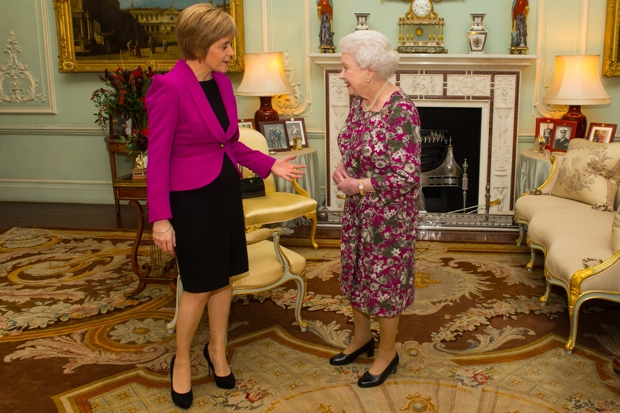So is Nicola Sturgeon planning ‘a quiet republican insurrection?’ The Times says so in a thundering leader today: Jacob Rees-Mogg has even outed the party as ‘closet republicans’. And why? Because the SNP is withholding £1.5m of funding that is due to the Queen. Or so we’re told.
The truth is a little more complex – and rather different. The money for the royal family does not come from the Crown Estate. It comes from HM Treasury, and under a formula set up in 2011 the Queen’s Budget is pegged to the profits of the Crown Estate (a kind of performance-linked pay, if you will. Very Tory).
The Crown Estate is the royal family’s sprawling property empire – an £8 billion kingdom of retail parks, hotels, farms, golf courses, Regent Street and the entire UK seabed. All revenue from the Crown Estate has been surrendered to the Treasury since 1760, with a fixed amount being granted to the monarch on an annual basis.
Now, as part of those oh-so-successful attempts to reduce support for the SNP, the UK government agreed to devolve control over the Crown Estate so that the Scottish Government would get control over the Scottish parts. This, of course, will diminish the profits of the remainder. But this, you might think, is easily remedied: rather than peg the so-called ‘Sovereign Grant’ to 15 per cent of the UK Crown Estate it could be pegged to, say, 18 per cent of the remaining Crown Estate. Simples.
At no point was it ever suggested that Scotland had to chip in towards the Sovereign Grant. Like defence and foreign affairs, it’s a reserved payment – the sole preserve of the UK government. Nicola Sturgeon may want to double the Queen’s pay; she may want it halved. It doesn’t matter, she has no control.
Now, it could well be that someone in Buckingham Palace thinks Scotland should have given the Queen the 15 per cent. But that was never part of the deal, as HM Treasury confirmed when I called them up.
So why the story? A senior courtier who briefed the Times said that ‘it would be nice if the proportion was increased from the rest of the UK’ – implying that taxpayers in England, Wales and Northern Ireland will have to cough up to compensate for the loss. When asked if Scotland would no longer be funding the monarchy, the courtier said simply: ‘Not through the Sovereign Grant, no.’
By which he presumably meant, ‘Yes, of course it will, because the Sovereign Grant is funded by all UK taxpayers, as it has been for the past couple of centuries. Duhhh!’
Again, the sum the Queen receives from HM Treasury under the Sovereign Grant is pegged to the crown estate’s profits; it does not come from those profits themselves. As Sturgeon’s spokesperson put it: ‘There is a formulaic connection between the two, but there is no financial connection between the two.’ And as a spokesman for HM Treasury said:
‘Scottish taxpayers will continue to fund a full and fair share of the Sovereign Grant, paid via the Consolidated Fund. The Grant will not be adversely affected by devolution – under the Sovereign Grant Act it cannot be reduced and the statutory review of the Grant will ensure that it continues to provide the resources needed to support the Queen’s official duties.’
Now, it may well be that Sturgeon is planning some kind of republican coup. But this certainly is not it.
Eleni Courea is an intern at The Spectator and a second-year politics student at King’s College, Cambridge. She is a co-chair of the King’s Politics Society and the incoming President of the King’s College Student Union.






Comments